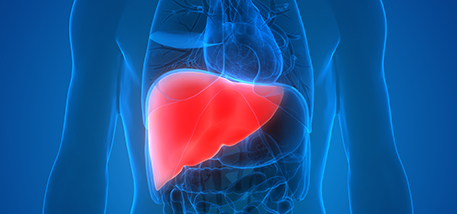
Liver disease
What is the liver?
The liver is one of the largest organs in your body. It is located in your right upper abdomen just beneath the rib cage. The liver has many necessary functions that include its ability to filter your system of toxins and aid in digestion by making bile, which is one of the main digestive juices.
Liver lesions
A "lesion" of the liver is just a fancy word for a spot or any abnormal area of the liver. Lesions are often found in the liver and may be benign (non-cancerous) or malignant (cancerous). Liver lesions that we evaluate and treat include:
- Liver cancer
- Colorectal cancer that has spread to the liver
- Neuroendocrine (carcinoid) tumors that have spread to the liver
- Gallbladder cancer
- Bile-duct cancer
- Benign lesions such as liver cysts, blood-vessel deformities such as hemangiomas (which can be thought of as birthmarks of the liver) and adenomas (benign growths - similar to polyps found in the colon - that can rupture, bleed, or become cancerous)
At Maryland Surgeons, we take a multidisciplinary team approach to make the right diagnosis and to design the best individual plan for you. We will help you and your family understand your diagnosis and treatment options. The experts that are typically involved in a multidisciplinary team include:
- Liver surgeons
- Medical oncologists
- Radiation oncologists
- Hepatologists
- Gastroenterologists
- Diagnostic and interventional radiologists
- Pathologists
- Genetic counselors
What are the risk factors for liver cancer?
- Men are more likely than women to develop liver cancer
- Those with a family history of liver cancer may be at an increased risk
- Heavy alcohol consumption
- Liver diseases such as cirrhosis or Hepatitis B and C
What are the warning signs of liver cancer?
Some common indicators include weight loss, nausea and pain, swelling or tenderness in the liver, and yellowing of the skin or the whites of the eyes (jaundice). Consult your doctor immediately if any of these symptoms occur.
How is liver cancer detected?
Liver cancer is detected using blood tests or imaging exams such as CT scans, MRI scans or by ultrasound.
How are liver cancers treated?
- Our patients are offered a full range of multi-disciplinary state-of-the-art diagnostic and treatment modalities:
- Surgery is the most common method of treatment. Many liver operations can be done in a minimally invasive fashion, including laparoscopy and robotic surgery.
- Chemotherapy is often used for most types of liver cancer, sometimes before surgery, and sometimes after.
- Radiation treatment is sometimes used to shrink the tumor before it is removed with surgery.
- Ablation is used to destroy (usually with very high temperature) liver tumors instead of removing them. The two main types of ablation are radiofrequency ablation and microwave ablation. Both types can be done either with a percutaneous approach (by interventional radiologists, without surgery, using a needle through the skin) or with an operative approach.
- Transarterial therapies are those treatments that are given through a catheter placed into an artery, similar to the way heart stents are placed. These therapies may be used alone or with surgery or ablation.
- Portal-vein embolization is sometimes used as a bridge to surgery.
Meet our liver surgeons: Dr. Patel and Dr. Cunningham
In Affiliation With Saint Agnes Healthcare

For more than 150 years, Saint Agnes Hospital has been dedicated to the art of healing by providing exceptional care to the greater Baltimore area. Built on a strong foundation of excellent medical care and compassion, Saint Agnes is committed to providing the best care for our patients for many years to come.
